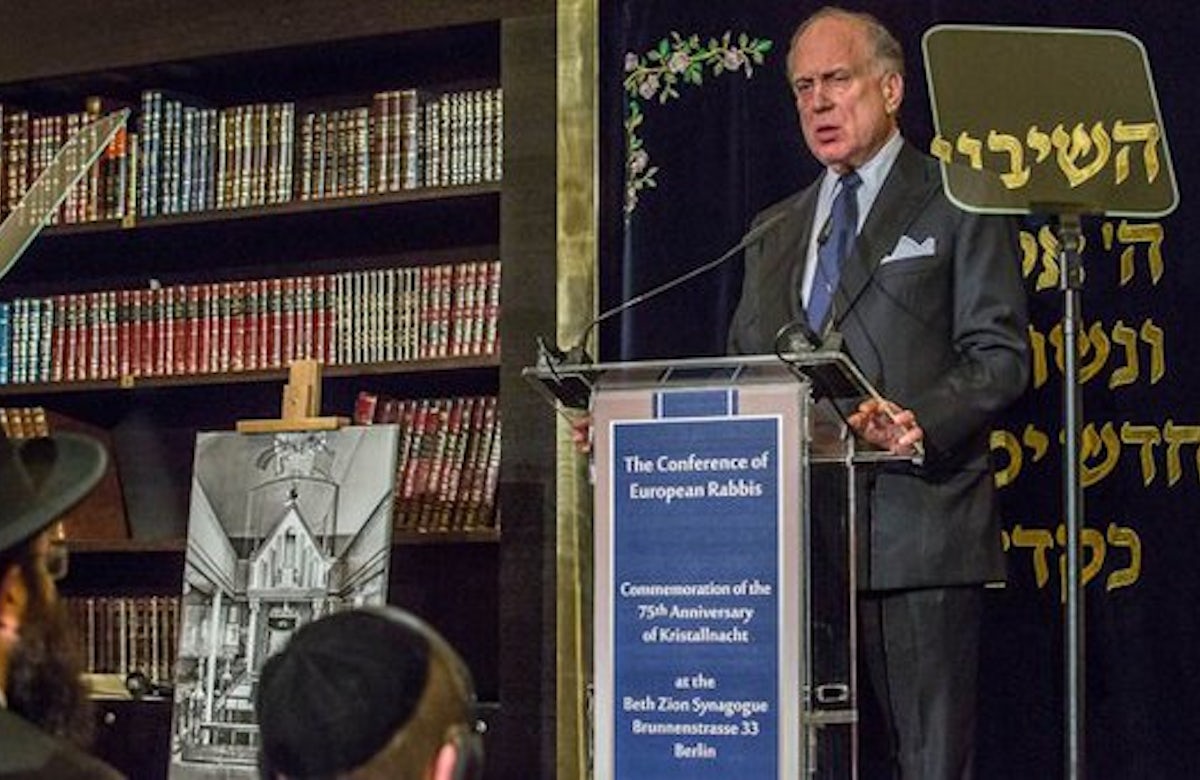World Jewish Congress President Ronald S. Lauder on the 75th anniversary of the Nazi November pogroms and their relevance for today.
 Seventy-five years ago this weekend, the entire world faced one of history's great moral tests. It failed miserably.
Seventy-five years ago this weekend, the entire world faced one of history's great moral tests. It failed miserably.
On 9 November 1938, Adolf Hitler set loose the darkest impulses of mankind in a brutal attack that raged across Germany and Austria. It was called Kristallnacht, or Night of the Broken Glass, referring to all the broken glass shimmering in the streets. More than 1,000 synagogues were burned, the windows of Jewish businesses were smashed and shops looted, individual Jews were rounded up and put into concentration camps. Some 400 were murdered.
Firemen stood idly by just to make sure the fires didn't spread past the synagogues. The police helped the rioters.
For the past 75 years, people have made the mistake of regarding this event merely as an inner-German affair. But Kristallnacht was much more than just a nation-wide pogrom against the Jews of Germany and Austria. It was really Hitler's test to see how the West would respond. And that lack of response would set into motion everything that followed.
In the five years following his rise to power in 1933, Adolf Hitler laid the groundwork for his plan to destroy Jews. He started with public intimidation, and in 1935 implemented racial laws that marginalized Jews within German society. They could not hold jobs in government or in universities. Jewish doctors who cared for Christian patients were barred from treating them. These changes were outrageous, but they were done gradually.
Hitler was always gauging the world's response. When he saw no backlash, the master intriguer understood he could move to the next level. Yet, in a strange inversion, as the laws became more draconian, the world's responses became more tepid.
On the night of 9 November 1938, it became open. The destruction of European Jewry had begun.
In an article published immediately after Kristallnacht, the Nazi Propaganda Minister Joseph Goebbels brazenly attributed the pogrom to the "healthy instincts" of the German people, which, he wrote, "is anti-Semitic. It has no desire to have its rights restricted or to be provoked in future by parasites of the Jewish race." And yet countries across the globe barred their doors to desperate German and Austrian Jews begging for entry.
President Roosevelt recalled the American ambassador from Berlin for "consultations," but he would not move Congress to ease its harsh immigration quotas for Jewish refugees. This was the country where a young Jewish poet, Emma Lazarus, penned the words most connected to the Statue of Liberty: " Give me your tired, your poor, your huddled masses yearning to breathe free … Send these, the homeless tempest tossed to me, I lift my lamp beside the golden door."
For European Jews in 1938, that comforting lamp went out.
 Today, Germany and Europe are a much better place than they were in 1938. Yet, we again see worrying signs. While Israel's neighbors slaughter hundreds of thousands of their own, we see the growing, visceral hatred of the Jewish state throughout Europe.
Today, Germany and Europe are a much better place than they were in 1938. Yet, we again see worrying signs. While Israel's neighbors slaughter hundreds of thousands of their own, we see the growing, visceral hatred of the Jewish state throughout Europe.
We see a United Nations that appears incapable of stopping any form of genocide and instead, focuses its attention and condemnation on the only democracy in the Middle East, Israel.
We see the mullahs of Iran pushing to create nuclear bombs along with the long-range missiles to deliver them. All the while, we hear Iran's leaders mockingly boast that they will wipe Israel from the pages of history.
Once again, we see world leaders incapable of acting, refusing to see what is right in front of them, pretending that what the Iranian mullahs say and what they do isn't real, that it's not really happening. We see a Western world that is lulled into a false sense of security by a new Iranian president whose track record is not nearly as good as people think.
Let's hope the world does not wait again until it is too late to stop the calamity.






